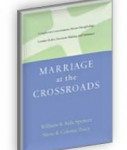Spencer, William and Aida and Tracy, Steve and Celestia. Marriage at the Crossroads: Couples in Conversation About Discipleship, Gender Roles, Decision Making, and Intimacy. InterVarsity Press Academic, 2009.
Meet the Authors
This book is co-authored by two couples.
William and Aida Spencer are both ordained pastors in the Presbyterian Church (USA) and both serve on the faculty of Gordon-Conwell Theological Seminary. Bill is professor of theology and the arts and Aida is professor of New Testament. William and Aida have been married over thirty-five years and have written or edited six books together.
Steve and Celestia Tracy have been engaged in a speaking ministry throughout the United States and Africa on sexuality, marriage and abuse for the past decade. Steve is on the faculty of Phoenix Seminary where he serves as professor of theology and ethics. Celestia is a licensed professional counselor and founding partner of Professional Counseling Associates, a private Christian counseling practice. Steve and Celestia have been married for over thirty years.
Book Basics
 The authors ‘ goal for the book is to explore “the two basic Christian views of marriage with both couples openly discussing each view” (p. 11). To accomplish this task, the book’s four main chapters are each developed around a theme: Marriage and Being Disciples of Jesus, Headship and Submission, Marriage Roles and Decision Making, and Marriage and Intimacy. The outline of each chapter is an essay by each couple followed by a summary section that outlines their areas of agreement and areas of disagreement. Both couples are evangelicals. The Spencers consider themselves egalitarians while the Tracys view themselves as soft complimentarians. A considerable percentage of the book’s content is consumed with the standard arguments and biblical texts. In that regard, the book offers nothing more than a recap of material available from so many other sources. The strength of the book is the sharing of personal marital experiences and a willingness to see that there is often greater similarity than difference on the practical aspects of marriage.
The authors ‘ goal for the book is to explore “the two basic Christian views of marriage with both couples openly discussing each view” (p. 11). To accomplish this task, the book’s four main chapters are each developed around a theme: Marriage and Being Disciples of Jesus, Headship and Submission, Marriage Roles and Decision Making, and Marriage and Intimacy. The outline of each chapter is an essay by each couple followed by a summary section that outlines their areas of agreement and areas of disagreement. Both couples are evangelicals. The Spencers consider themselves egalitarians while the Tracys view themselves as soft complimentarians. A considerable percentage of the book’s content is consumed with the standard arguments and biblical texts. In that regard, the book offers nothing more than a recap of material available from so many other sources. The strength of the book is the sharing of personal marital experiences and a willingness to see that there is often greater similarity than difference on the practical aspects of marriage.
The final chapter of the book, Responses from Three Couples, is an attempt to allow for a multicultural response to the authors’ first four chapters. It includes essays from three couples representing three different backgrounds: Hispanic American, Asian American, and African American. This worthwhile idea was not developed as I had hoped. The richness of thirty plus years of marital experience and the willingness to share from it made the main section of the book worth reading, however in the final chapter one couple has only six years of marital experience upon which to draw and another focused only on pastoral ministry with no real references to personal marital experience.
So What?
Every Christian, both those who are married and those who are single, should give consideration to her or his view of marriage.
- Are you a complimentarian or an egalitarian?
- Why?
- How has Scripture informed your perspective?
For more information on the complimentarian view, visit the Council on Biblical Manhood and Womanhood.
For more information on the egalitarian view, visit Christians for Biblical Equality.